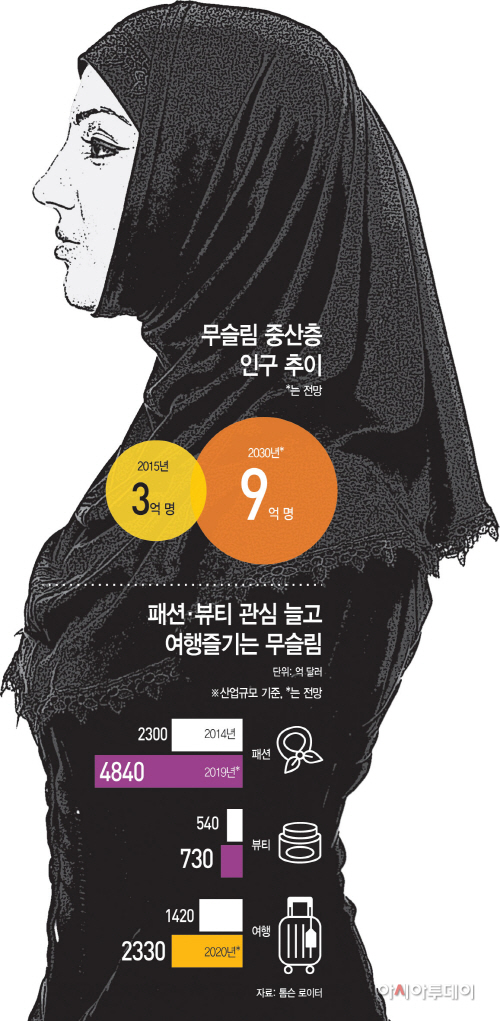 |
By AsiaToday reporter Lee Mi-hyun - Muslim millennials (b. 1980 and 2000), the so-called 'Generation M', are emerging as the next big opportunity for global brands.
Experts say that Generation M, who are increasingly educated and keen to live in the modern world, will lead the Muslim consumption market, reported The Straits Times on Nov. 14.
With more than 60% living in the Asia-Pacific region, the Muslims have been largely ignored by global brands. However, the number of Muslims is increasing considerably high.
According to the latest Global Islamic Economic Review by global knowledge services provider Thomson Reuters, global spending by Muslims last year was US$1.9 trillion, mainly in food and beverage, fashion, cosmetics, travel and recreation. It is expected to increase to US$2.6 trillion by 2020.
Ogilvy Noor, the Islamic branding consultancy of Ogilvy & Mather, has forecast that young Muslim women will lead the Muslim consumption, as they have greater disposable income with higher education level and employment rates.
△ Beauty - Great demand for halal cosmetics in Asia-Pacific region
Earlier this month, US cosmetics brand CoverGirl chose Muslim beauty blogger Nura Afia as its first endorsement model and beauty ambassador wearing a hijab. As we can see from this, Muslim women are increasingly interested in the beauty industry.
According to Thomson Reuters, global Muslim spending on halal cosmetics is expected to grow to $73 billion by 2019 with Asia Pacific region showing strong demand.
Halal - which means "allowed" under Islamic law in Arabic - is also being applied to cosmetics. Halal cosmetics must not contain alcohol and any parts or substances of animals, and they should meet the strict Islamic standards.
Market researcher Future Market Insights (FMI) has forecast that the halal cosmetics market in Asia Pacific will show a 9.9% compound annual growth rate (CAGR) by 2020. FMI added that the demand for color cosmetics is especially prominent.
In Asia, Indonesia and India are the two major consumers of the halal cosmetics market.
Indonesia's Muslim Council (MUI) explained that demand for halal labeled cosmetics is on the rise, as consumers in Asia Pacific became more aware about ingredients in conventional cosmetics along with improved living standards.
△ Muslim fashion - From fast fashion to haute couture
The Muslim fashion market was US$230 billion in 2014, and the figure is expected to double to $484 billion by 2019.
Fast-fashion apparel companies such as Uniqlo and H&M are launching products targeting Muslim fashionistas as they advance to Southeast Asian market. Dolce & Gabbana launched its abaya and hijab collection for the first time as a luxury brand this year.
Muslim fashion has also entered the haute couture event, which leads the world fashion trends. In this year's New York Fashion Week, which is one of four major fashion weeks in the world, a Muslim fashion designer presented a fashion show featuring hijabs in every outfit.
△ Travel industry - Halal travel
The Muslim travel market is also expected to grow to $233 billion by 2020, accounting for one-quarter of the world's travel industry.
The Hala Travel 2016 by UK-based research firm Context Consulting revealed that Muslim women play an influential role in the travel decision-making process and planning, and they prefer family-friendly destinations, reported Indonesia's Jakarta Post.
Mikhail Goh, the founder of Muslim travel agency 'Have Halal Will Travel, said, "Generation M travelers are increasingly choosing adventurous destinations."
Muslim travelers are also choosing package travel products, but they are increasingly moving away from basic and expanding their choices to new destinations.
Muslim travel products are offering halal dining options and praying possibilities.
△ Going beyond halal to tayyab
"Muslim consumers are very open to try things, as long as it does not compromise our faith. Global brands should be bold," said Muslim women Nura in an interview with the Straits Times.
In the meantime, Generation M wants to go beyond halal to tayyab, which roughly translates as "ethical and wholesome."
"Generation M consumers are looking for brands to be more sophisticated in their engagement, rather than just sticking a halal label on products," said Shelina Janmohamed, vice-president of Ogilvy Noor.
#Generation M #Muslim millennial #global brands #hijab #halal
Copyright by Asiatoday
Most Read
-
1
-
2
-
3
-
4
-
5
-
6
-
7





















